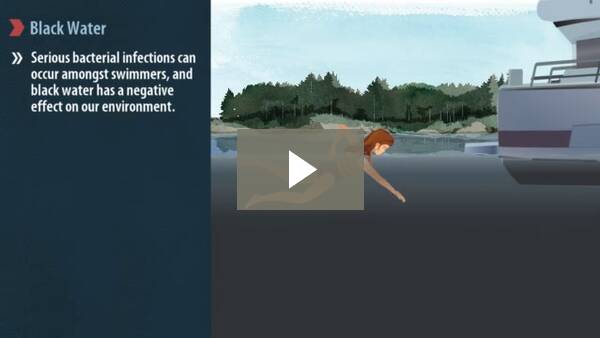Marine Environment and Environmental Responsibility
It is illegal to pollute Canadian waterways and marine environment. Always use caution when refuelling and be sure not to spill excess fuel into the water. When operating your craft, be mindful of and respect natural inhabitants and ecosystems.
You are prohibited from dumping oil, litter or waste overboard. Even small oil spills may cause serious long-term effects. Waste from marine toilets must be held in a holding tank and pumped out at an approved marine facility. Boaters are also prohibited from dumping bilge water containing oil or other chemicals overboard. You should check your bilge on a regular basis to ensure it’s free of oil, grease and chemicals. If chemical pollutants are found in the bilge, use an environmentally-friendly absorbent product to soak up chemical waste. You must report to government authorities any discharge of a pollutant from your vessel that occurs, or the probability that such discharge will occur where the discharge is prohibited by the Canada Shipping Act, 2001.
Invading Species
In recent years, Canada’s waters have been under threat from aquatic plants, fish and invertebrates (mussels, snails etc.) that originate from other parts of the world, and that have been introduced (accidentally or intentionally) to Canada’s waterways. With no natural predators, high reproductive rates and superior survival capabilities, these ‘invading species’ can rapidly take over Canada’s waterways and wetlands with harmful effects on our native fish, wildlife, habitats and ecosystems. Invading species include Eurasian Watermilfoil, Purple Loosestrife and Zebra Mussels.
Invading species are spread by recreational boats and watercraft, as well as fishing equipment. Before entering any body of water you should clean your boat to remove foreign species and to reduce the likelihood of spreading invading species. Inspect your boat, trailer and equipment. Remove visible plants or animals. Drain water from your boat’s motor, live wells and bilge or transom wells on land and away from any waterway.
Wash and dry your boat, trailer and equipment. Remember that some species can survive out of water. Use one (or all) of the following methods to clean your boat of invading species:
- Rinse with hot tap water (at least 40° C)
- Spray with high pressure water (250 psi)
- Dry your boat and equipment before moving to another body of water
Anglers should keep empty bait buckets on land and away from the shoreline. They should consult provincial fishing regulations for information about the use of baitfish.
Never release live bait from one body of water to another. Report sightings or obtain information from your local provincial resource agency.
Black Water
Raw, untreated sewage is called ‘black water’. All boats fitted with a marine toilet must be equipped with a holding tank where black water can be stored until it can be disposed of at an approved pump-out station.
Allowing black water to escape into Canada’s waterways and marine environment is against the law. Serious bacterial infections can occur amongst swimmers, and black water has a negative effect on our environment. Dual systems with ‘Y’ valves (which allow waste to be dispelled from the boat) are illegal and must be retrofitted. Portable toilets are legal only if they are securely fastened to the craft and have a permanent fixture enabling them to be emptied at an approved facility. If you’re planning an extended trip, you should plan to use onshore facilities wherever possible.
Noise Pollution
Pleasure craft are not permitted within 5 nautical miles (9.26 km) of any Canadian shore unless they are fitted with a noise muffling device. A ‘wet exhaust’, where noise is muffled by cooling water discharged through the exhaust pipe, is not considered a noise muffling device. Operators should check with their local Canadian Coast Guard for any exemptions to this rule.
Boaters should remember that sound travels further on water than on land. Operating continuously in one area disturbs both those on land and on water. Don’t ’buzz’ around in one area, keep loud music to a minimum and respect those on shore, as well as your fellow boaters.





